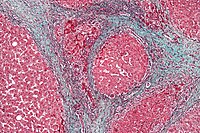
Photo from wikipedia
Hepatorenal syndrome‐acute kidney injury (HRS‐AKI) is a serious complication of severe liver disease with a clinically poor prognosis. Supportive care using vasoconstrictors and intravenous albumin are the current mainstays of… Click to show full abstract
Hepatorenal syndrome‐acute kidney injury (HRS‐AKI) is a serious complication of severe liver disease with a clinically poor prognosis. Supportive care using vasoconstrictors and intravenous albumin are the current mainstays of therapy. Terlipressin is an efficacious vasoconstrictor that has been used for 2 decades as the first‐line treatment for HRS‐AKI in Europe and has demonstrated greater efficacy in improving renal function compared to placebo and other vasoconstrictors. One of the challenges associated with terlipressin use is monitoring and mitigating serious adverse events, specifically adverse respiratory events, which were noted in a subset of patients in the recently published CONFIRM trial, the largest randomized trial examining terlipressin use for HRS‐AKI. In this article, we review terlipressin's pharmacology, hypothesize how its mechanism contributes to the risk of respiratory compromise and propose strategies that will decrease the frequency of these events by rationally selecting patients at lower risk for these events.
Journal Title: Liver International
Year Published: 2022
Link to full text (if available)
Share on Social Media: Sign Up to like & get
recommendations!